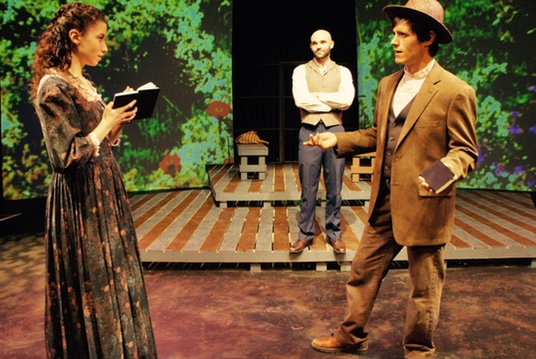
Through Sun 12/11
Henry David Thoreau was a rebel. A rebel with many causes. He opposed taxation, contested war on foreign soils, was a strong advocate for the abolition of slavery, refused to pay fees for things that he thought were earned and therefore should not cost money (e.g., as a Harvard graduate he rejected paying the dollar required for getting his official graduation certificate). He believed in the interdependence of man and nature, independent thinking, education through discovery, and he rebuffed organized religion.
An educated man, he was unusual in his mid-19th century era where few even went to what is now known as high school. He was a deep thinker whose essay “Civil Disobedience” is an argument for nonconformity to an unjust state, and is quoted even today.
His creativity is reflected in his many life-teaching quotes, including: “To make a deep mental path, we must think over and over the kind of thoughts we wish to dominate our lives.” And “This world is but a canvas to our imagination.”
On the surface, Jerome Lawrence and Robert Lee’s 1970 play, The Night Thoreau Spent in Jail, which is now on stage at Ensemble Theatre, appears to be a histro-drama about Thoreau. In reality it is more than that. Besides giving a snapshot of the man’s life and philosophy, it is a Vietnam-era exploration of resistance to war, a central Thoreau concept.
The script, like many Lawrence and Lee writings, draws on events from United States history that speak to contemporary issues. Their Inherit the Wind addressed intellectual freedom and McCarthyism. The Gang’s All Here examined 1920 government corruption. Even their delightful Auntie Mame cast an evil eye on conformity and hypocrisy.
Lawrence and Lee are local guys. Lee was born and grew up in Elyria. Jerome Lawrence Schwartz was born in Cleveland, graduated from Glenville High School in 1933 and went to Ohio State. Ironically, The Night Thoreau Spent in Jail received its first production at OSU in 1969.
Based on a real historical fact, Thoreau did spend a night in jail in Concord, Massachusetts, for refusing to pay a poll tax because the money might be used to pay for the Mexican-American war. He refused to leave jail when his aunt paid his tax bill.
It is easy, after the recent election of a xenophobe who shows little regard for science, women, the physically and mentally ill, minorities and those of different views, to see the ideological relevance of the play to contemporary, educated, liberal-thinking audiences.
The script jumps in time order, opening with Ralph Waldo Emerson, Thoreau’s friend, remembering the “man of Walden.” We then see Thoreau in jail, interacting with Bailey, an illiterate wanderer accused of arson. A trip further back in time including Thoreau’s youth presents years at Harvard, frustration in trying to teach children to think but being thwarted by the lockstep school curriculum, and the unappealing requirement to flog students. It exposes Henry’s close relationship with his brother John, with whom he founded an unsuccessful outdoor school, the death of John when he accidentally cut himself and bled to death, his conflicts with Emerson and many of the Concord residents, and the hints of what is to come that leads to Thoreau’s future as a major luminary of the intelligencia.
The play is well-written. The direction, under the focused guidance of Ensemble’s artistic director Celeste Cosentino, is equally encompassing. The cast is outstanding. Geoff Knox, undoubtedly one of the best young local professional actors, embraces the role of Thoreau with complete focus. He not only has the perfect New England language sound and cadence, but develops a real characterization. It is worth the price of admission to see Knox/Thoreau in action.
Terry Burgler is totally believable as Emerson, the champion of individualism, who is noted as essayist, lecturer and poet who led the transcendentalist movement of the mid-19th century. He is nicely balanced by Leslie Stager, as Lidian Emerson, the great man’s compassionate wife.
The rest of the cast, mainly Joseph Pine (John, Henry’s brother), Sara Bogomolny (Ellen, John and Henry’s love interest), Allen Branstein (Bailey, Henry’s cellmate), and Davion Brown (Williams, a freed slave who Henry befriends), are all solid in their performances.
Stephen Vasse-Hansell’s set design, mainly a platform with electronic graphics changing to set the place, works well.
CAPSULE JUDGMENT: A well-conceived script gets an excellent production. It is not an escapist theatrical experience filled with laughs and physical movement, but a presentation which will please many due to its philosophical message. It’s a must-see for anyone interested in good theater.
The Night Thoreau Spent in Jail, which runs around two hours with intermission, will be on stage Thursdays through Sundays through Sun 12/11. For tickets call 216-321-2930 or go online to ensemble-theatre.
Ensemble’s next full staged production is The Phantom Toll Booth, running 1/13-22/17. It’s the tale of Milo’s adventures in the Land of Wisdom which forces him to think about many new things.
[Written by Roy Berko, member, American Theatre Critics Association, Cleveland Critics Circle]